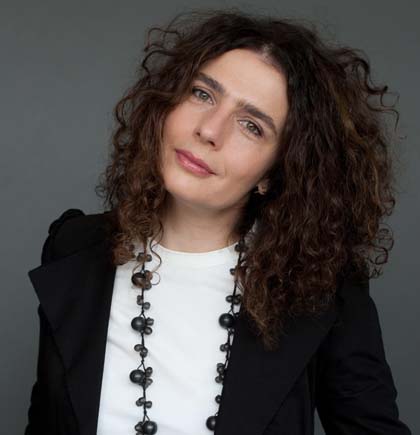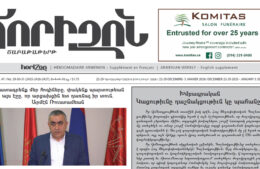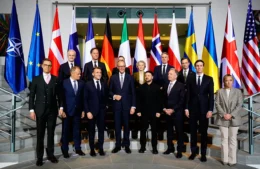Arsinée Khanjian: Whose centennial should this be anyway?
- (0)
Arsinée Khanjian: Whose centennial should this be anyway?

A commemorative concert dedicated to the Armenian Genocide Centennial took place on Saturday, November 7, at the George Weston Recital Hall of the Toronto Centre for the Arts, under the artistic direction of Maestro Nurhan Arman, conductor of the Sinfonia Toronto string orchestra. The guest speaker of the day was award-winning actress Arsinée Khanjian who, in a very thoughtful and inspiring speech, discussed the importance of the genocide centennial for Armenians, Turks and the international community. Below is her speech.
Whose centennial should this be anyway?
Armenians around the world have been asking themselves what it will mean to commemorate in 2015 the centenary of an event referred to as the first modern genocide of the 20th century.
Many have been feeling a sense of urgency to do something meaningful to honor the memory of over a million souls who perished between 1915 and 1917, during the extermination of a people from their historic lands at the hands of the Young Turks in the crumbling years of the Ottoman Empire.
Of course, to do something meaningful, today, in the face of indifference and active denial by the Turkish state requires, more than ever, an active will to remember.
Armenians do remember because they continue to be reminded, through family relics and spoken memories, through historical archives, scientific research, and academic publications of the starvation, rape, humiliation, dispossession, proselytizing, slavery, desecration and mutilation of bodies of men, women, and children who walked to their deaths. Four generations later and from far away lands, the fractured walls of hollowed out homes, churches, schools and cities of Western Armenia rumble with the longing of those who survived.
With time passing, Armenians face other present day reminders of painful and soaring losses of a different kind of cultural heritage, specifically, that of a mother tongue, Western Armenian, spoken and written in its own alphabet for centuries but now listed as a disappearing language.
To remember is basic to our human experience, and essential for the development of humankind.
But who bears the responsibility to remember a full 100 years later, a full century after the systematic destruction of a place and its people?
If the Armenian Question remains without proper redress after so long why not simply to move on?
Why not abandon the past out of exhaustion, exasperation, geopolitical interest, and mostly the desire to forget this historical tragedy in order to contemplate the other atrocities that have followed and continue to plague our societies?
We don’t move on because the Armenian genocide cannot be forgotten.
It cannot be forgotten simply because this history of the early 20th century, belongs to Europe, to America, to all of Western civilization and indeed to the world.
This history, the archetype of genocides in the last hundred years, has repeated itself elsewhere on the planet, within many cultures without much difference in the topography of the crime.
This history demands, therefore, scrutiny and involvement by the international community, which, in turn, should feel the obligation for an honest and moral understanding of its complicity through inaction and silence.
Germany set the example for culpability followed by significant reparations for its crimes against 6 million Jews and many other victims who perished at the hands of the Nazis.
It is known, however, that this act of recognition did not happen simply because Germany was a defeated nation.
The international response to the atrocities of World War II and the Holocaust made a key contribution in establishing the importance of acknowledging these crimes as a universal responsibility.
The Nuremburg trials, which brought human rights into the domain of global politics, redefined morality at the international level, and gave political currency to the concept of crimes against humanity and racism.
This is to say, the will of Germany to do what was the only dignifying gesture after such an unspeakable deed as genocide, was ushered in with a firm hand by those countries which felt the moral obligation to prosecute its perpetrators.
In this way, the Armenian Genocide also demands the involvement of the international community, which has to understand its obligation to promote justice for past crimes. This obligation requires more than recognition alone.
The official political and historical will of present day Turkey is to sublimate the deeds of its forefathers, through an ongoing and pervasive policy of denial both within Turkey and with its NATO allies.
Nationalism and its symptoms are fostered and tolerated by the State in all form of displays through hate speech, intimidation, censorship and laws that suffocate the democratic voice, freedom of speech, and human rights principles.
To remain vigilant, therefore, is a responsibility that should matter to all friends of Turkey because as we speak minority communities with men and women of various cultural and religious backgrounds, are in daily and immediate danger risking nothing less than their right to existence, just as they were one hundred years ago.
Within these communities, there are a number of courageous individuals and organizations who, in the spirit of Hrant Dink, the Armenian journalist slain in 2007 in Istanbul, want to understand and reveal the Armenian genocide as a history that belongs to all of Turkey and to all generations of Turkish citizens, who have been robbed of the truth by a nationalistic discourse which persists, 100 years later, in an unlikely but all the more worrisome association with fundamentalist Islam.
What Armenians desire is for Turkey to engage in a truly democratic path, which allows its people to atone for the deeds of their forefathers, and relieves them from the guilt of the crime of genocide through denial.
So, today, I would like to ask:
“Whose Centennial should this be anyway?”
The one of Armenians alone?
Or, the one of Turks as well?
Or, perhaps more significantly, the one of the Armenians, the Turks, and the international community?
It is no longer necessary to identify the victim and the perpetrator of this history.
Renowned historians from around the world have established and authenticated the veracity of the Armenian genocide.
But the world has often turned a blind eye to the irrefutable facts.
Despite international and historical models that address crimes against humanity as a universal responsibility, there has also been an established practice of breaking away from these precedents.
If Turkey currently exercises an aggressive and open policy of denial it is only because the international community has chosen to suspend its own values, ethics, and duty through indifference, and as importantly, because of strategic expediency in the name of overt and uncensored economic and security benefits.
This approach and position unequivocally continues to grant impunity to a reprehensible chapter in both Turkey’s and Western civilization’s modern history.
On this centennial of the Armenian genocide, I would like to repeat 12 points, aptly established by Genocide Watch, which list ways to deny the act of genocide:
1. Question and minimize the statistics
2. Attack the motivations of the truth-tellers
3. Claim that the deaths were inadvertent
4. Emphasize the strangeness of the victims
5. Rationalize the deaths as the result of tribal conflict
6. Blame “out of control” forces for committing the killings
7. Avoid antagonizing the perpetrators who might walk out of the peace process
8. Justify denial in favor of current economic interests
9. Claim that the victims are receiving good treatment
10. Claim that what is going on doesn’t fit the definition of genocide
11. Blame the victims
12. Say that peace and reconciliation are more important than blaming people for genocide
Entertaining and/or exercising part or all of these 12 points constitutes genocide denial and begs the question of why should one choose to identify with this less than honorable face of humanity.
Without our engagement in an active and informed support for true principles of democracy and their implementation, without morality and ethics within political transactions, humankind simply ceases to be kind.
This centenary of the genocide of the Armenian people has to be understood and embraced by all of us as our history, our memory and our duty to remember.
In order to leave behind a better imprint, to forge an honorable legacy for generations to come entails our participation in rejecting indifference, rejecting blindness, and rejecting silence out of fear, everywhere and in the name of everyone so that truth, memory and justice can prevail.


















